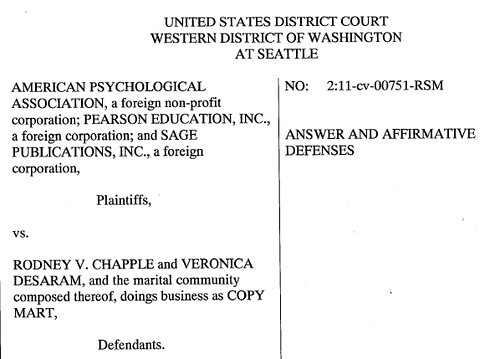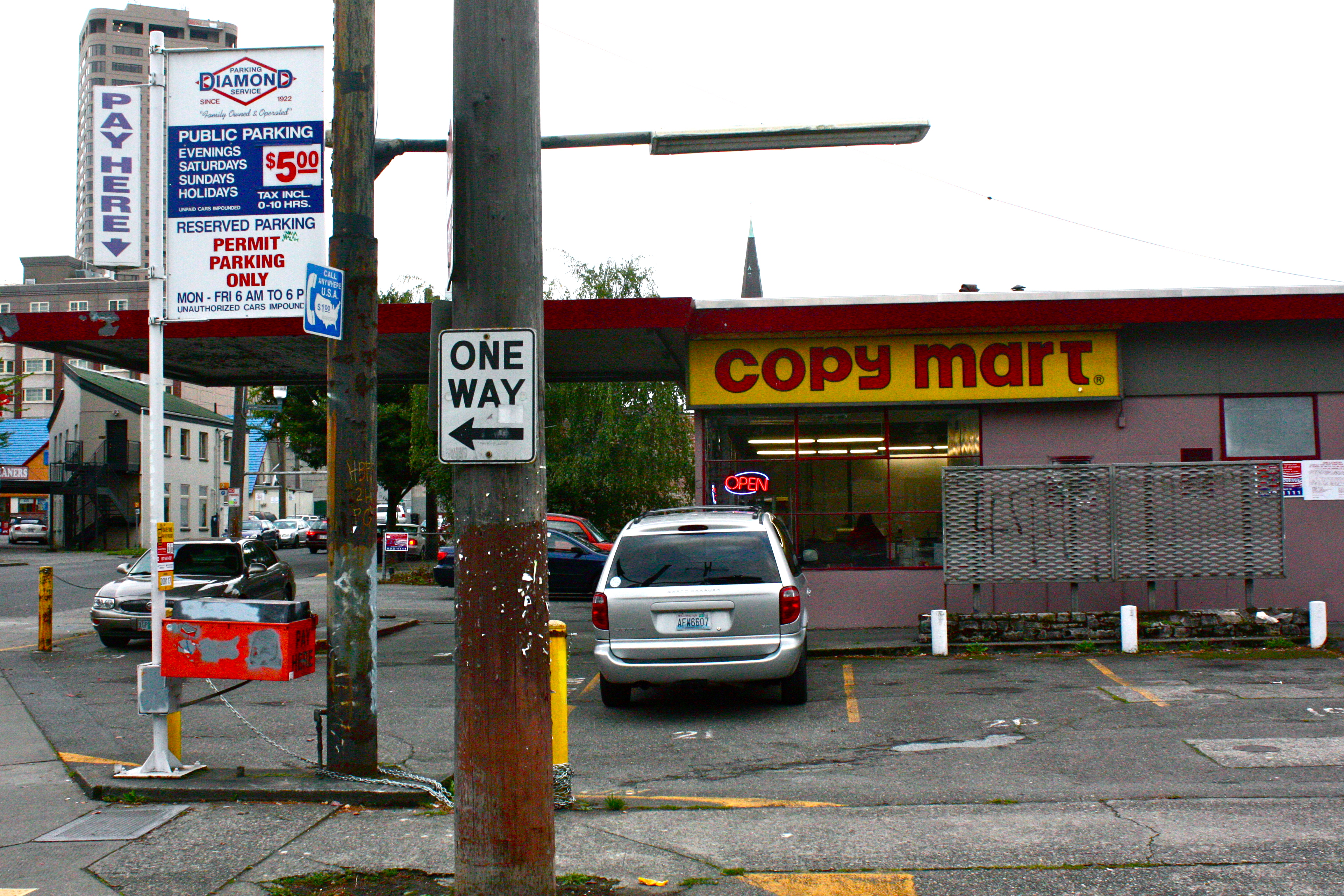
 Copy Mart, just across Madison from SU (Image: CHS)
Copy Mart, just across Madison from SU (Image: CHS)
The staff at Seattle University’s the Spectator have turned up a copyright lawsuit brought against a Capitol Hill copy shop that serves the school. CHS has learned more details of the suit brought against E Seneca’s Copy Mart by a contingent of publishers that contends the shop violated copyright laws by producing “coursepacks” featuring material without licensing the works.
“The legal action taken by the plaintiffs may affect professors and students who previously used Copy Mart as an alternative to [Seattle University’s] SUpercopy,” the Spectator reports.
In the lawsuit filed late last spring, lawyers for the American Psychological Association, Pearson Education and SAGE Publications allege that Copy Mart produced coursepacks including the publishers’ copyrighted material without licensing the content:
Defendants have been engaged in routine and systematic reproduction of materials from plaintiffs’ publications, without seeking permission from plaintiffs or from CCC. This infringement takes the form of (without limitation) coursepacks for courses taught at Seattle University.
The works include The American Psychologist Vol 45 No 5, Women, Law and Social Control, 2d Ed., Gender and Nation and Sexualities, Vol. 8 No. 2.
The plaintiffs also lay out the way they say the system is supposed to work:
Like many copy shops in cities where colleges and universities are located, Copy Mart does a substantial business in “coursepacks.” The contents of a typical coursepack include journal articles, excerpts from books, and perhaps other printed materials, selected by a professor as required reading for a particular course. The professor delivers the course syllabus to the copy shop. The copy shop obtains copies of the books and other materials in the syllabus from a library or from the professor concerned, copies the portions identified by the professor, and binds them in an inexpensive binding. The copy shop then sells these coursepacks to students at a profit.
Copy shops are required to arrange for permission to copy the materials in coursepacks. Frequently, copy shops do so through an independent agency known as Copyright Clearance Center, Inc. (“CCC”), of Danvers, Massachusetts.
In order to expand and facilitate the distribution of their publications and compliance with their copyrights, plaintiffs have licensed CCC, a non-profit intermediary, to authorize commercial photocopying of articles from plaintiffs’ journals and excerpts from plaintiffs’ books. Any copy shop such as Copy Mart can comply with copyright by reporting its coursepack photocopying activities to CCC and paying a copyright fee for each copy made. CCC in turn reports aggregate licensing information to plaintiffs, and pays plaintiffs the copyright fees collected, less an agreed amount to compensate CCC for its services.
The publishers are seeking monetary damages “in an amount reflecting not only the infringement but also the willful nature of the infringement” and an injunction against Copy Mart to cease any further “unauthorized reproduction” of their works.
Statutory damages can range up to $150,000 per infringed work if the violation is found to be willful.
In response, Copy Mart’s husband and wife owners Rodney Chapple and Veronica de Saram and their corporation Mim’s Inc. contend that they are “without knowledge whether any of the coursepacks Mims, Inc. reproduced in fact violated the Plaintiff’s copyright” and that “if there was a violation of Plaintiff’s copyright, the Defendants intend to name as additional defendants the parties who made this false certification.”
Their lawyer Bradley Wolf also writes that, if there are any statutory damages, they should be at minimum levels. “Any copyright infringement in this case would have been minor in extent, and unintentional.”
McNaul Ebel Nawrot & Helgren, the plaintiffs’ Seattle attorneys, said they plan to examine records “seeking to identify other unauthorized uses of their material in other coursepacks produced by Defendants.”
The complaint does not specify how the publishers became aware of the situation.
The case is being heard in the US District Court of Washington and faces months of wrangling before its currently scheduled trial date in July 2012.



There’s precedent: the big lawsuit that eight publishers filed against Kinko’s in 1989, resulting in a $12 million dollar judgment against Kinko’s. Financially damaged, they eventually had to sell out to Fed Ex.
FedEx acquired Kinko’s in 2004, 15 years after 1989. And for 2.4 billion dollars.
That lawsuit had nothing to with their sell out to FedEx.
I am often surprised that businesses can attempt to make a profit with other people’s copyrighted material and then claim they didn’t know. The Fair Use laws are fairly clear, and you’re virtually guaranteed not to be prosecuted if you do not attempt to make money from the materials you are copying.
If I’m following the plaintiff’s language properly, it seems that the people depositing the materials to be copied had signed documents indicating that they had a right to copy them or that they had otherwise falsely certified that the copyrighted materials had been approved for use in this manner (being copied and bound into a for-profit coursepack). The faculty who did this should be held liable, not just the photocopy shop they paid to make copies.
I suppose not, although the decision in the suit doesn’t seem to have happened until 1991. They were certainly never the same company after the suit; besides the judgement, they lost all the revenue that printing the course packs once brought in, which was once estimated at a skidillion dollars a year. I hope this satisfies your mania for correct information in CHSB comment threads.
But educational use *is* a “fair use” according to the law; and the professors make no profit in this situation, so they aren’t guilty of profiting from the copying.
The 80’s suit against Kinko’s was for $2 million, not $12 million.